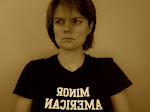i recently got this email and thought i'd posit this question to the blog.
see if anyone has anything to say about it.
let us know what you think:
from KD:
is it possible to "unintentionally obfuscate" something?
For example:
"Perhaps the field has been unintentionally obfuscating the entirety
of its history by only recognizing texts from the last ten years when,
in fact, there are field-specific texts that are sixty years old."
End of email.
well.... is it possible?
***
more from me when my cold is gone. and also, i have a 'real job' now...
so i think that means i'll be less blog obsessed. i don't know.
Monday, April 24, 2006
Subscribe to:
Post Comments (Atom)


5 comments:
it is absolutely possible to "unintentionally obfuscate"---by unclear thinking or by leaving out important points of reference because one feels they're assumed, or lots of other ways---but what's quoted here seems to be addressing a purposive or wilful under-recognizing. ?
i like the blog-obsessed pringle. i'd hire you to blog all day if i could.
i do think it is possible to unintentionally obfuscate something. unless you don't believe in accidents.
but i think i do, so.
see, this is where i'm at. i have trouble with accidents.
and... it seems the quote he gave me... it seems like one is forced to question the authority of the authorities who have unintentionally obfuscated. you see? is it like... a half-empty/half-full argument? if you have a distrust of authority you may not believe in the unintentional obfuscation.... but if you have a trust... you may.
where the hell is kevin?
I agree with Suzanne; the example seems to be a euphemism for "check out these field-specific texts because they'll give you fundamental historical background pre-1996." Unintentional obfuscation here is due to the fact that none of us can be expected to have had read, digested, and understood the whole of knowledge, history or otherwise. That's why we have smart friends to tell us of our unintentional lack. "Read this," they say. And we love them for it.
i'm right here, pringle.
thanks for post'g the Q; i've got it on my blog now, too. of course, no one's really gone there yet, but...
i've asked a bunch o' people this Q & it appears we're @ a consensus--except for 1, & that wd be my advisor. apparently, A. doesn't believe in accidents.
obviously, i believe that it is possible to "unintentionally obfuscate" something. and, dang it, i think it's possible for the very reasons everyone's said here so far.
apparently, though, there are people who believe that the world is
flat, that
happenstance is non-existent,
and that words
are limited to forming a finite number of phrase-fancies.
Post a Comment